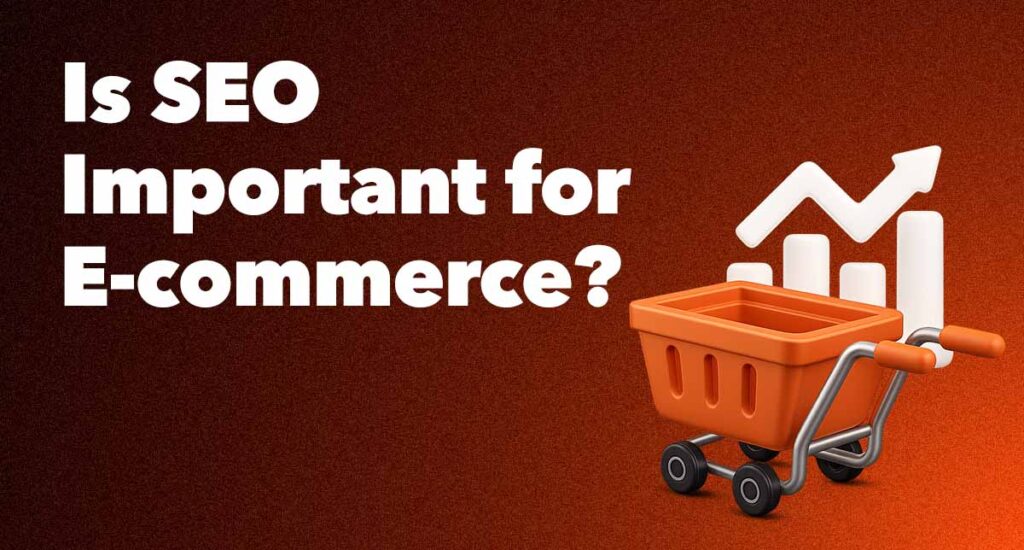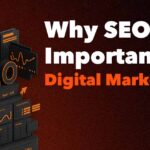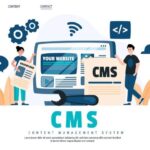All businesses involved in e-commerce need an optimized website to reach a wide audience. According to data from Statista, the global e-commerce market is expected to reach 8 trillion dollars by 2027. This demonstrates how rapidly this industry has grown and how influential it has become. These facts also show why SEO is important for ecommerce.
Therefore, you need to prepare your website for this competitive market by using proper SEO standards and strategies. Of course, there are many important points to consider. One of them is understanding why SEO is important for e-commerce in the first place. In this article, we will explore this topic in more detail.
Is SEO Worth It for E-commerce?
Yes, SEO is worth it for e-commerce businesses. SEO helps your website appear in search engine results, which brings more visitors to your store. These visitors are typically searching for specific products or services, which makes them more likely to convert. By improving your SEO, your website can achieve higher rankings and attract more qualified traffic without overspending on advertising.
More traffic usually leads to more sales. This means SEO is directly connected to your revenue. If your website appears on the first page of search results, your chances of getting more clicks and conversions are much higher. To start, you should learn the basics of what is E-commerce SEO and how it works. This knowledge can help you build a strong SEO strategy that brings results.
What is the Role of SEO in E-commerce?
SEO plays a key role in making sure your online store is visible to the right audience. It helps search engines understand what your website is about and match it with what users are searching for. This increases the chances that people will visit your website instead of a competitor’s. Now that you understand what is the Role of SEO in E-commerce, let us go deeper and look at some important facts you should not ignore.
E-commerce SEO Is Not Just About Keywords
Many people think e-commerce SEO is only about using keywords. But in reality, it is much more complex. SEO involves technical setup, content quality, user experience, and much more. It is important to know the difference between e-commerce SEO vs. Normal SEO to apply the right strategy for your store.
Here are 5 important areas of e-commerce SEO:
- Site Architecture: A clear and organized website helps both users and search engines. A good structure allows pages to be crawled and indexed easily.
- Product Page Optimization: Product titles, descriptions, and images must be clear and informative. This helps users find what they want and encourages them to buy.
- Mobile Optimization: Most users browse and shop using mobile devices. A mobile-friendly website improves user experience and boosts rankings.
- Page Speed: Fast-loading pages keep visitors on your site. Slow websites increase bounce rates and reduce sales.
- Technical SEO: This includes clean code, well-structured URLs, and XML sitemaps, all of which help search engines crawl and understand your site more effectively.
Tracking ROI and KPIs in E-commerce SEO Projects
Tracking the success of SEO in e-commerce is very important. It shows you if your efforts are working or not. You need to measure your results using real data and clear goals. This helps you improve your SEO strategy over time. One of the best ways to do this is by learning how to measure SEO performance and its Tips. In this section, we will look at some key metrics that help you understand the return on your SEO investment.
- Return on Investment (ROI): Return on Investment, or ROI, shows how much profit you earn compared to how much you spend on SEO. For example, if your SEO costs $1,000 and brings in $5,000 in sales, your ROI is strong. This number helps you see the real value of your SEO project. By tracking ROI, you can decide if your SEO is helping your business grow or if changes are needed. It is one of the most important signs of success in any e-commerce SEO campaign.
- Conversion Rate: Conversion rate tells you how many visitors turn into buyers. If 1,000 people visit your website and 50 of them make a purchase, your conversion rate is 5%. This metric shows how well your website turns traffic into actual sales. A high conversion rate means your product pages, pricing, and user experience are working nicely. If the number is low, you may need to adjust your content or checkout process to improve results.
- Organic Traffic Growth: Organic traffic means visitors who find your website through search engines like Google. Growth in this type of traffic means your SEO is working. If more people visit your site without clicking on paid ads, you save money and reach more users. Tracking organic traffic over time helps you understand which pages perform best and what keywords bring in the most visits. It is a clear sign of progress in any SEO project.
- Trackable KPIs: Key Performance Indicators (KPIs) are the numbers that show if your SEO plan is successful. These include metrics like page views, average session duration, bounce rate, and goal completions. Each KPI gives you useful information about how visitors behave on your site. For example, if people spend more time on your product pages, it means they are interested. By setting and tracking KPIs, you can make smart decisions based on data, not guesses.
- Keyword Rankings: Keyword rankings show where your website appears in search engine results for certain terms. If your target keywords move from page three to page one, your visibility grows. This means more people are likely to click and visit your site. Monitoring keyword rankings helps you see if your SEO efforts are paying off. It also helps you focus on terms that matter most to your business and adjust your content when needed.
- Click-Through Rate (CTR): Click-through rate, or CTR, shows how many people click on your link after seeing it in search results. A low CTR could mean your title or meta description is not attractive enough. A high CTR means your listing stands out, and people want to learn more. Improving CTR often leads to more traffic and higher sales. It also tells search engines that your content is useful, which can improve your rankings.
- Page Load Time: Page load time is the amount of time it takes for your website to appear on the screen. If your pages are slow, visitors may leave before they see your products. Fast-loading websites improve user experience and are also a ranking factor for search engines. Reducing image sizes, using better hosting, and fixing code can make your site faster. A smooth and fast website leads to happier customers and better SEO performance.
- Bounce Rate: Bounce rate measures how many people leave your website after visiting only one page. A high bounce rate usually means visitors did not find what they expected. This could be due to weak content, slow pages, or confusing layouts. By improving your content and making the site more user-friendly, you can lower the bounce rate. This helps keep visitors on your site longer and increases the chance of making a sale.
What an Agency Brings to Ecommerce SEO?
Working with a professional agency can improve your e-commerce SEO results. Agencies bring expert skills, tools, and strategies that are hard to manage alone. Their team can focus on SEO while you run your business. This helps save time and reach better results faster. To learn more, check out our page on SEO Services and see how professionals can support your growth.
Here are a few key benefits of hiring an agency:
- Expertise and Experience: Agencies work with many clients across different industries. They know what works and what does not, and they apply that knowledge to your project.
- Advanced Tools: SEO agencies use tools that most businesses do not have access to. These tools help with keyword research, site audits, competitor analysis, and performance tracking.
- Strategic Vision: Agencies do not just focus on quick wins. They plan long-term strategies based on your goals, helping you build lasting online growth.
- Efficiency and Speed: Agencies have teams and processes that move quickly. They can complete tasks like audits, optimizations, and content updates much faster than an internal team.
- Ongoing Support: A good agency offers regular updates and guidance. They watch trends, adjust strategies, and keep your SEO performance on track.
Key Tasks to Outsource in Ecommerce SEO
Some SEO tasks require deep knowledge and constant updates. These tasks can take a lot of time and effort if done alone. Outsourcing them helps you focus on running your store while experts handle the technical work. If you still wonder Is SEO Really Worth It?, outsourcing these tasks is often one of the best ways to get strong results without wasting time or money.
Here are 6 key SEO areas to outsource:
- Technical SEO: Technical SEO involves making sure your website is easy for search engines to crawl and index. This includes fixing broken links, improving page speed, and ensuring mobile-friendliness. Experts can find and solve technical problems faster and more accurately.
- Content SEO: Creating helpful and relevant content takes time and planning. SEO agencies can write product descriptions, blog posts, and guides that attract users and improve rankings. Good content keeps visitors on your site longer and builds trust.
- Link Building: Link building means getting other websites to link to yours. It helps improve your authority and search engine rankings. Agencies often have connections and strategies to build high-quality backlinks safely and effectively.
- CRO (Conversion Rate Optimization): CRO focuses on turning visitors into buyers. This includes testing layouts, buttons, and messaging. Professionals use data to suggest changes that can increase your sales without more traffic.
- On-Page Optimization: This task includes editing titles, meta descriptions, headers, and images. It helps search engines understand your content better. Outsourcing this ensures every page is set up to rank well and attract clicks.
- SEO Audits and Reporting: Audits find weak points on your site, and reports track your SEO progress. These tasks require both tools and experience to do properly. Agencies can provide clear, regular updates that show where you stand and what to improve.
Let Experts Grow Your Ecommerce Traffic
Growing your e-commerce traffic takes time, planning, and expert work. At HDM, we help online stores get more visitors, rank higher in search engines, and turn traffic into real sales. Our team knows what works for e-commerce SEO and uses proven methods to get results. If you want strong, long-term growth, let us take care of your SEO strategy. To learn more about us, visit HDM Agency and explore our tailored SEO services.
Here are six actions we take to help your online store grow:
- Complete SEO audit for your website
- Keyword research based on real user intent
- Link building through high-authority websites
- Monthly performance reports and strategy updates
- SEO content writing for product and category pages
- Technical optimization for faster and smoother performance
Final Thoughts on E-commerce SEO Success
In this guide we discussed what is the Role of SEO in E-commerce. So. you know that E-commerce SEO is not just about adding keywords. It is about building a smart and solid foundation for long-term success. You need to focus on traffic, conversions, and content quality. Working with experts and tracking the right KPIs helps your business grow faster and better. Each part of the SEO strategy supports your goal of reaching more customers and increasing sales.
If you are ready to take your e-commerce business to the next level, contact our HDM Agency in the United Arab Emirates. You can call us at +971 56 26 01 368 or simply fill out our consultation request form. Let us help you create a powerful SEO plan that delivers real results.
FAQ
- How long does it take to see SEO results for an e-commerce store?
Usually, it takes 8 to 12 weeks to see clear results. But it depends on your industry, competition, and starting point.
- Do I need SEO if I already use paid ads and is SEO worth it for eCommerce?
Yes. SEO brings long-term traffic and reduces your dependency on paid ads. A mix of both is often the most effective.
- What platforms do you support for e-commerce SEO?
We work with Shopify, WooCommerce, Magento, and custom-built websites. Each platform has its own SEO best practices.
- Is SEO a one-time task or an ongoing process?
SEO is an ongoing effort. Search engine rules, trends, and competitors are always changing.
- Can you help fix SEO mistakes made by other agencies?
Yes. We offer full SEO audits and can fix errors left by previous service providers to help you recover and grow.









